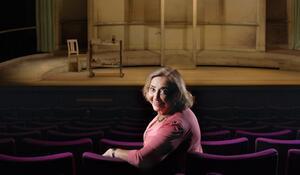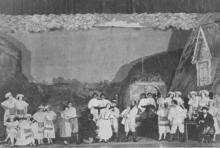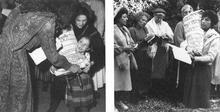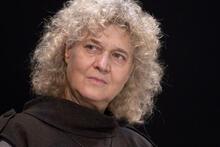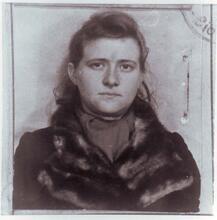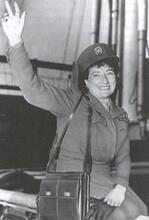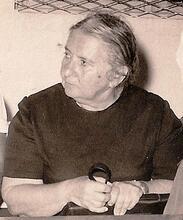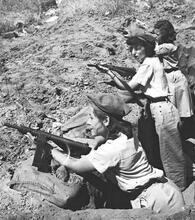Lia Koenig
Lia Koenig in 2012. Photo courtesy of Wikimedia Commons.
Lia Koenig is known as the First Lady of Israeli Yiddish Theater. Koenig trained at the Bucharest Yiddish State Theater and became known for her 1957 performance of the lead role in The Diary of Anne Frank. She immigrated to Israel in 1961 and earned the Joseph Klausner Prize in 1962 for playing Eve in Aaron Megged’s Genesis at the Habimah Theater. Among her major roles were the old lady in Eugene Ionesco’s The Chairs (1970) and the title role in Brecht’s Mother Courage (1975). Critics raved about her performances, leading to a sudden flourishing of her career. She was awarded the Israel Prize in 1986, the Israel Theater Prize for lifetime achievement in 1999, and the EMET Prize in 2012.
Lia Koenig performed at the Habimah theater without a break for more than forty years. In 1986 she was awarded the Israel Prize for her distinguished achievements as an outstanding actor. The Prize Committee based its choice on Koenig’s extraordinary performances in significant and complex roles in world drama and the noteworthy achievements of her acting. In her artistic work, she combines first-class comic ability with sensitive dramatic power.
Early Life and Family
Lia Koenig was born in Łódź, Poland, in 1929 to parents who were both esteemed actors. Her father, Joseph Kamien (1900–1942), was among the founders of the Vilna troupe, which revolutionized the artistic dimensions of Yiddish theater. Her mother, Dinah Koenig (1907–1964), performed in various kinds of Yiddish theater from “shund” (cheap popular theater) to esteemed art theater, from early childhood. During World War II the family fled to the Soviet Union and performed in Tashkent. After Kamien’s death, his widow married the Yiddish actor Isaac Chavis (1911–1991). When the war was over the family settled in Bucharest, where Dina found work as an actor in the Bucharest Yiddish State Theater. Although Lia grew up in a family soaked in the atmosphere of theater, her parents did not encourage her to take up an acting career. At the age of seventeen, she married the actor Zevi Stolper (1922–1998), who was the first to notice her great talent and encouraged her to pursue it.
Acting Career
She began her career with two years of acting training in the Stanislavsky method at the Bucharest Yiddish State Theater, where she soon became one of the outstanding young actors. Among her notable roles were Toinette in Moliere’s The Imaginary Invalid, Havah in Shalom Aleichem’s Tevye the Milkman and Katherina in Alexander Ostrovsky’s The Storm. Her highest artistic achievement was the title role in The Diary of Anne Frank (1957), for which she won an award from the Romanian Ministry of Culture. Though an adult actor, she shaped the thirteen-year-old character so skillfully that even her own husband did not recognize her when he first saw her on stage.
In 1961 Koenig and Stolper immigrated to Israel. In spite of the many offers she received to play in Yiddish theater, Koenig decided to learn Hebrew in order to be integrated into the Hebrew theater. She studied the language intensively for four months. Only five months after her arrival in Israel, when she hardly spoke the language, she was invited to Habimah and received her first role in Hebrew—Eva in Brecht’s Mr. Puntila and His Man Matti (1962). Shortly afterward a leading role followed—Eve in Aaron Megged’s Genesis (1962), for which she was awarded the Joseph Klausner Prize.
However, Koenig did not immediately become one of the Habimah stars. She was a virtuoso actor with a charismatic theatrical presence and a highly skilled performance range, which could easily shift from cabaret to serious realistic embodiments of a large variety of characters. Yet this very dense theatrical texture made it difficult for her to fit into the stereotypical typecasting that was popular in the realistic wave of the 1960s in Israeli theater. As a result, she was offered mostly minor roles in insignificant plays.
At the same time, she established her position as the first lady of Israeli Yiddish theater. Her husband, a Yiddish writer and theater director, translated and adapted plays into Yiddish to suit her performing abilities, for example in a dramatic collage about the myth of the Garden of Eden. The large Yiddish theater audience in Israel was thrilled to see Koenig perform in Yiddish. During the 1960s she and Stolper went on annual international tours with this material. In 1968–1969 they performed for a year and a half in South America. In her activities in the framework of Yiddish theater Koenig continued to develop the refined theatricality of her acting. She enjoyed performing in this language and often expressed her disappointment at the lack of a good Yiddish repertory theater in Israel.
During the 1970s the Habimah director David Levin, who was interested in modern European drama, was enchanted by Koenig’s unique acting abilities. He cast her as the old lady in Eugene Ionesco’s The Chairs (1970) and gave her the title role in Brecht’s Mother Courage (1975). These two highly poetic, complex, and grotesque roles enabled Koenig to display her virtuosity as a mature actress. The theater critics praised her acting and criticized the management of Habimah for not allowing her to perform more frequently. These roles were a turning point in her career and from that point on she was considered one of the leading actresses of Habimah. More leading roles followed: Naomi in Allen Ginsberg’s Kaddish (1976), Tsirel Horwitz in A Simple Story after S. Y. Agnon (1979) and Leitche the shopkeeper in Hillel Mittelpunkt’s The Shop (1982).
Fame and Awards
From the 1980s on her status rose, and she beczme one of the leading ladies on the Israeli theater scene. Among her significant roles were the title role and that of Mahlah in Gordin’s Mirele Efros (1987), in which she alternated between the roles; Lyubov Andreyevna in Chekhov’s The Cherry Orchard (1988); Levivah Popoch in Hanoch Levin’s The Labor of Life (1989); the monodrama Stars with No Heaven based on Yiddish pieces arranged by Zevi Stolper; Claire Zachanassian in Friedrich Dürrenmatt’s The Visit of the Old Lady (1994) and Woman A in Edward Albee’s Three Tall Women (1997).
Koenig was never identified with one single role, although since a relatively early stage in her career she associated with roles of charismatic elderly women. In 1999 Hillel Mittelpunkt wrote The Tourist’s Guide to Warsaw, whose leading character, Magda, was written especially for Koenig and was based upon her own vital personality and dramatic capability. In 1998 she was widowed after more than fifty years of marriage. The couple had no children. In 1986 she won the Israel Prize and in 1999 she was awarded the Israel Theater Prize for her life’s work. In 2012 she received the 2012 Laureates of Emet Prize In Culture and Art In Field: Acting and Directing in the Theater.
Ben-Meir, Dov, ed. Who and What in Tel Aviv-Jaffa (Hebrew). Tel Aviv: 1997; Zylbercweig, Zalmen. Lexicon of the Yiddish Theater (Yiddish) Vol. VI. Mexico City: 1969.
Dorit Yerushalmi. “Roles That Started an Era, Part 3.” Teatron 4 (2001): 82–84. The Israeli Documentation Center for the Performing Arts, File No. 11.1.6.
Oral history interview with artist: https://www.yiddishbookcenter.org/collections/oral-histories/interviews/woh-fi-0000566/lia-koenig-2014.

